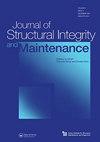Mechanical properties of high-strength steel–polyvinyl alcohol hybrid fibre engineered cementitious composites
IF 3.1
Q2 ENGINEERING, CIVIL
Journal of Structural Integrity and Maintenance
Pub Date : 2021-01-02
DOI:10.1080/24705314.2020.1823558
引用次数: 12
Abstract
ABSTRACT With the advancement of material technology, the use of high-strength and high-performance materials in the construction industry is gaining popularity. Steel–polyvinyl alcohol (steel–PVA) hybrid fibre engineered cementitious composites (ECC) is one of such high-performance class of construction materials whose mechanical properties are not well studied in the literature especially in high-strength matrix. Therefore, in this paper, the mechanical properties of four different grades of high-strength steel–PVA ECC are experimentally investigated. ECC with nominal compressive strengths from 60 to 100 MPa are developed. Their mechanical properties including compressive and tensile stress–strain behaviour, elastic modulus and toughness are studied with particular focus on high-strength matrix. Test results show that the developed steel–PVA ECC could achieve good tensile (~0.8%) and compressive (~0.5%) ductility for general structural applications. Simple empirical relationships to predict the elastic modulus and tensile strength of the developed steel–PVA ECC as a function of their compressive strength are suggested. Moreover, an analytical model to generate a complete compressive stress–strain curve of the high-strength steel–PVA ECC is proposed and verified against the experimental results. The proposed stress–strain model would present a useful reference for non-linear analysis of structural elements utilising steel–PVA ECC.高强度钢-聚乙烯醇混杂纤维工程水泥基复合材料的力学性能
摘要随着材料技术的进步,高强度、高性能材料在建筑行业的应用越来越普遍。钢-聚乙烯醇(钢-PVA)混合纤维工程水泥基复合材料(ECC)是一类高性能建筑材料,其力学性能在文献中没有得到很好的研究,尤其是在高强度基体中。因此,本文对四种不同牌号的高强度钢PVA ECC的力学性能进行了实验研究。开发了标称抗压强度为60至100MPa的ECC。研究了它们的力学性能,包括压缩和拉伸应力-应变行为、弹性模量和韧性,特别关注高强度基体。测试结果表明,开发的钢-PVA ECC在一般结构应用中可以获得良好的拉伸(~0.8%)和压缩(~0.5%)延展性。提出了简单的经验关系,以预测开发的钢-PVA ECC的弹性模量和拉伸强度与其抗压强度的函数关系。此外,提出了一个生成高强度钢-PVA ECC完整压应力-应变曲线的分析模型,并与实验结果进行了验证。所提出的应力-应变模型将为使用钢-PVA ECC的结构元件的非线性分析提供有用的参考。
本文章由计算机程序翻译,如有差异,请以英文原文为准。
求助全文
约1分钟内获得全文
求助全文
来源期刊

Journal of Structural Integrity and Maintenance
ENGINEERING, CIVIL-
CiteScore
3.90
自引率
9.50%
发文量
24
 求助内容:
求助内容: 应助结果提醒方式:
应助结果提醒方式:


